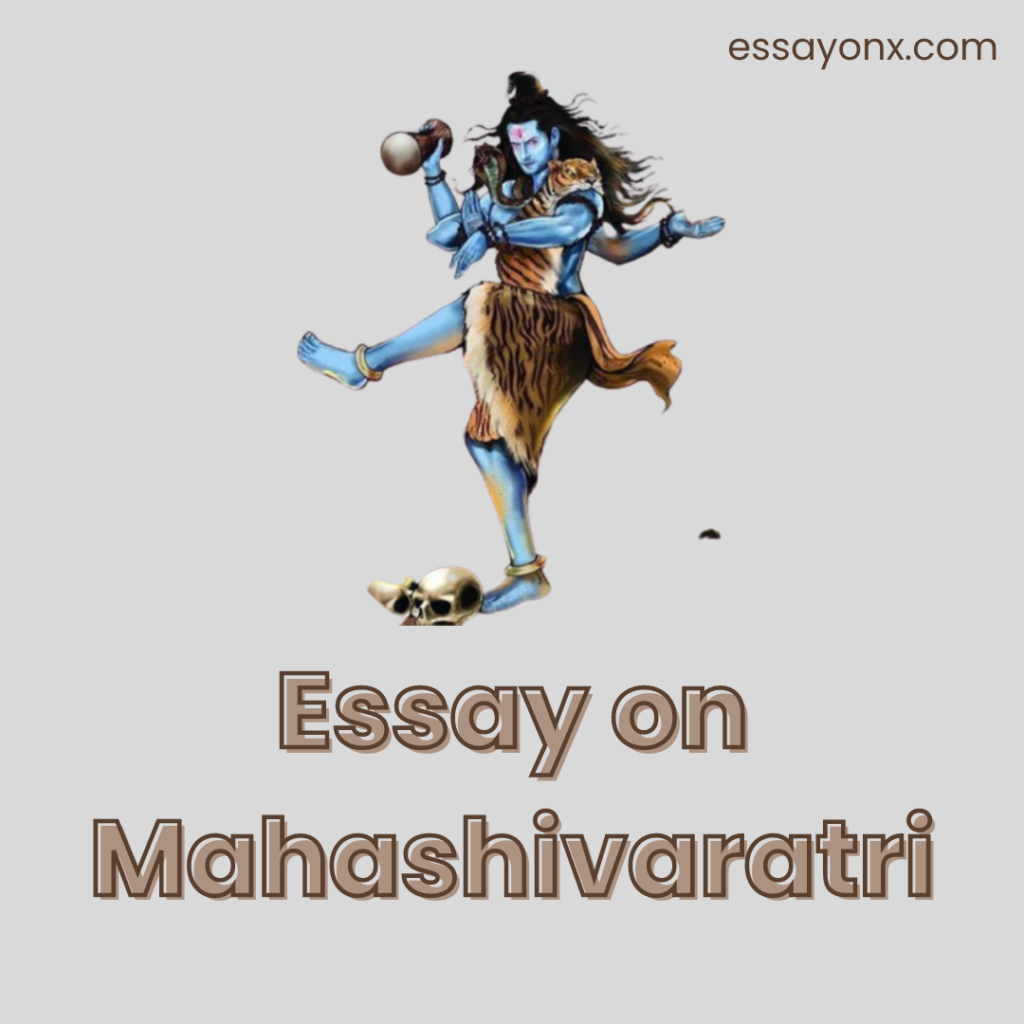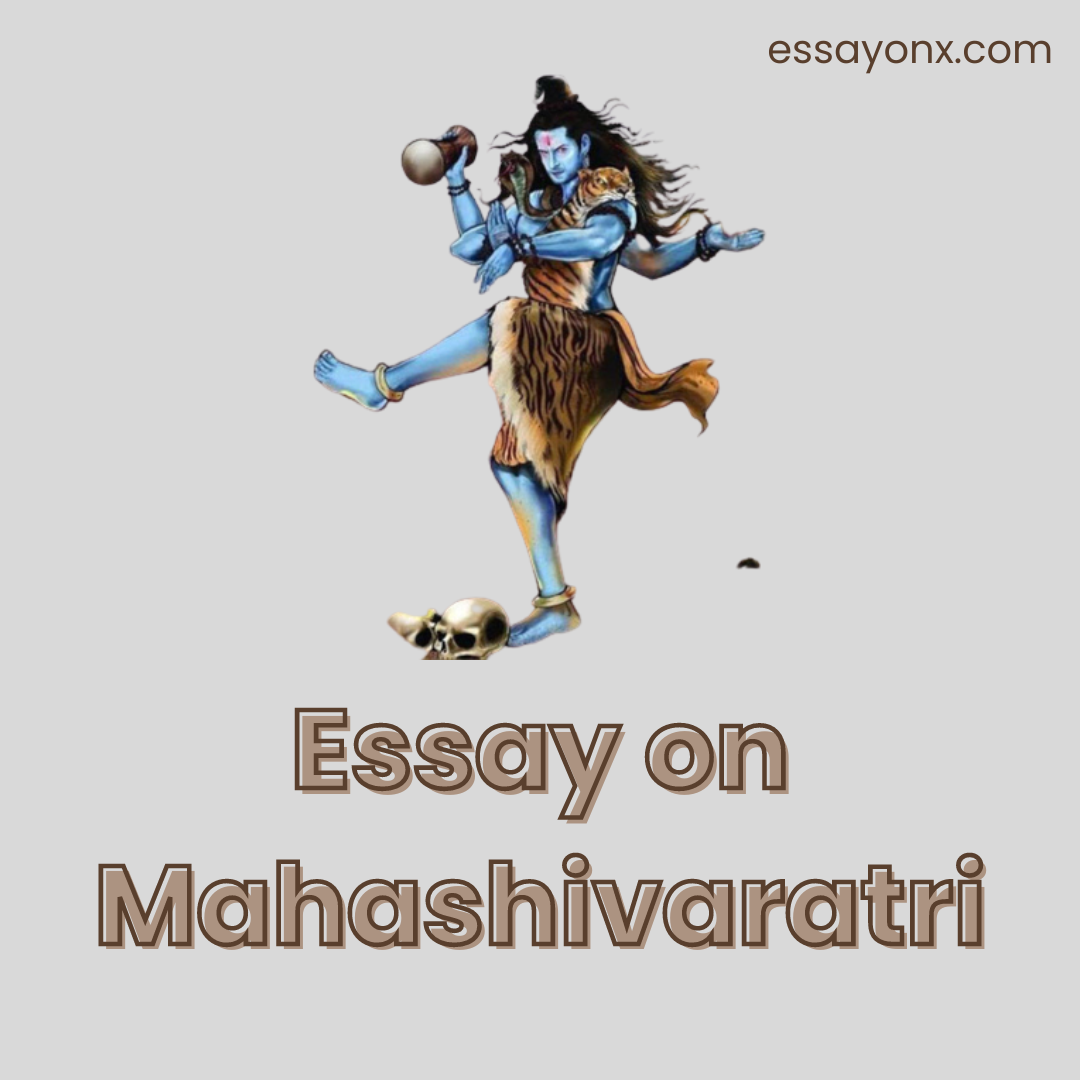Essay on Mahashivaratri: The Auspicious Night of Lord Shiva
Introduction:
Mahashivaratri, also known as “The Great Night of Shiva,” is one of the most significant festivals celebrated by Hindus around the world. Observed on the 14th night of the waning moon in the Hindu month of Phalguna (February-March), Mahashivaratri holds deep spiritual and cultural significance.
Origin and Legend:
The origins of Mahashivaratri can be traced back to ancient Hindu scriptures, particularly the Puranas. One of the most popular legends associated with this auspicious day revolves around the marriage of Lord Shiva and Goddess Parvati. According to mythology, Goddess Parvati performed intense penance to win the affection of Lord Shiva. Impressed by her devotion, Lord Shiva agreed to marry her on the auspicious night of Mahashivaratri. Hence, this day is also celebrated as the union of Shiva and Shakti, symbolizing the divine union of masculine and feminine energies.
Another legend associated with Mahashivaratri is the churning of the ocean (Samudra Manthan) by the gods and demons to obtain the nectar of immortality (amrita). During this cosmic event, a pot of poison (halahala) emerged from the ocean, threatening to destroy the universe. To save the world, Lord Shiva consumed the poison, but held it in his throat, turning his neck blue. Hence, Mahashivaratri is also known as the night of Shiva’s divine intervention to protect the universe from destruction.
Religious Significance:
Mahashivaratri holds immense religious significance for Hindus, who believe that observing fasts and performing rituals on this day can invoke the blessings of Lord Shiva and attain spiritual enlightenment. Devotees throng to Shiva temples across the country, offering prayers, performing abhishekam (ritual bathing of the Shiva lingam), and chanting hymns and mantras dedicated to Lord Shiva.
The significance of Mahashivaratri extends beyond religious boundaries, as it symbolizes the victory of good over evil, light over darkness, and knowledge over ignorance. It is a time for introspection, self-reflection, and seeking forgiveness for past wrongdoings. Devotees engage in meditation and spiritual practices to purify their minds and cultivate virtues like compassion, humility, and devotion.

Customs and Rituals:
The customs and rituals associated with Mahashivaratri vary from region to region, but certain practices are commonly observed by devotees. Fasting is an integral part of Mahashivaratri, with many devotees abstaining from food and water throughout the day and night. The fast is believed to purify the body and mind, allowing devotees to focus their energies on spiritual pursuits.
Devotees visit Shiva temples in large numbers, especially the twelve Jyotirlinga shrines, which are considered highly auspicious for worship on Mahashivaratri. Special ceremonies are conducted throughout the night, including Rudrabhishekam (ritual worship of Lord Shiva), bhajans (devotional songs), and recitation of Shiva’s 108 names (Shiva Ashtottara Shatanamavali).
Celebrations and Festivities:
Mahashivaratri is celebrated with great fervor and enthusiasm across India and in Hindu communities around the world. Temples are adorned with flowers and lights, and the atmosphere is filled with the sound of bells and chants praising Lord Shiva. Devotees stay awake all night, engaging in devotional activities and seeking the blessings of Lord Shiva.
In addition to religious rituals, Mahashivaratri is also a time for cultural celebrations, with music, dance, and drama performances dedicated to Lord Shiva. In some regions, processions featuring elaborately decorated idols of Lord Shiva are taken out through the streets, accompanied by traditional music and dance.
Conclusion:
Mahashivaratri is more than just a religious festival; it is a celebration of faith, devotion, and spiritual awakening. It reminds us of the timeless wisdom of Lord Shiva, who symbolizes the ultimate reality beyond the material world. As we immerse ourselves in the festivities of Mahashivaratri, let us strive to cultivate the qualities of compassion, humility, and inner peace, following in the footsteps of the divine. May the blessings of Lord Shiva fill our lives with happiness, prosperity, and spiritual fulfillment.
Optional: This essay delves into the multifaceted aspects of Mahashivaratri, shedding light on its historical significance, religious customs, and cultural celebrations. As devotees across the globe come together to celebrate this auspicious occasion, let us rejoice in the divine presence of Lord Shiva and seek his blessings for a prosperous and spiritually enriching life.


